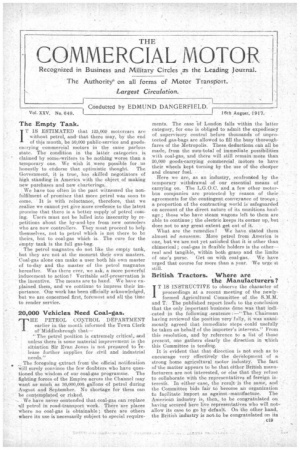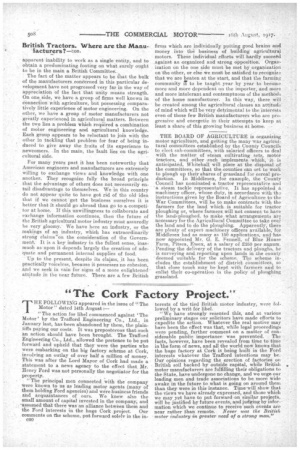The .Empty Tank. .
Page 1

Page 2

If you've noticed an error in this article please click here to report it so we can fix it.
-T IS ESTIMATED that 125,000 motorcars are / without petrol, andthat there May, by the end of this month, be 50,000 public-service and goodscarrying commercial motors in the same parlous state. The condition in the latter categories, is claimed by some/writers to be nothing worse, than a temporary one. We wish it, were possible for us honestly to .enclorse that optimistic thought. The Government, it is true, has ' skilled negotiators of high standing in America with the object of making new purchases and new charterings.. ' .
We have too often in the past witnessed the nonfulfilment of promises, that more petrol was .soon to come. It is with 'reluctance', therefore, that we realize we cannot yet give 'snore credenoe to thelate.st promise that there is a better supply of 'petrol' coining. Users must not be lulled into insecurity by repetitions about the by-and-bye from new . consolers who are now controllers. They must proceed to help themselves, not to petrol which is not there to be theirs, but to coal-gas which is. The cure for the empty tank is the full gas-bag.
The petrol magnates do not like the empty tank, • _but they are not at the moment their own masters.. Coal-gas alone can make a user both his own master of to-day and the master of the petrol magnates hereafter. Was there ever, we ask, a more powerful inducement to action ? Veritable self-preservation is the incentive. The means are -to hand. We have explained them, and we continue to impress their importance. Our work has been officially acknowledged, but we are concerned first, foremost and all -the time to render service.
20,000 Vehicles .Need Coal-gas., •
THE PETROL . CCn\TTROL ' DEPARTMENT earlier in, the month informed the Town Clerk ofiViiddlesbrough that— . " The Petrol position is extremely critical,. and -unless there is some material improvement in the sitUation Sir Evan ..Jones is' not prepared to Se. lease farther supplies for civil and industrial
needs." .
The foregoing e,,,,,xtract from the official notification ._ will surely convince the few doubters who have questioned the wisdom of our coal-gas programme. . The fighting forces of the Empire across the Channel may want asmuch as 30,000,000 gallons of petrol during August and September. No shortage for them can
be eonteinplated or risked? :. . , .
--. We have never contended that coal-gas can replace all petrol in road-transport work. . There 'are places Where no coal-gas is obtainable ; there are others where its use is necessarily subject to special require
ments. The case If London falls within the latter category, for one is obliged to admit the expediency of, supervisory. control before thousands of Unprotected gasTbags are allowed to fill the busy thoroughfares of the Metropolis. These deductions can all be made, from the Sum-total of immediate possibilities with coal-gas, -and there will still remain more than 20,000 goods,carrying eommercial. motors to have their wheels kept turning by the. use of the cheaper
and cleaner fuel. •• . • .
Here we are, as an industry, confronted by the temporary withdrawal .of our .eSsential means of carrying on. • The L,G.O.C. arid,a few other motorbus comPanies are pretectedhy reason of -their agreements for the contingent, conveyance of troops ; a proportion of the contracting world is' safeguarded on account. of the direct nature of its munitions haulage.; those who have steam wagons left to them are able to continue ; the electric keeps its corner up, but does not to any great extent get out of it. • . What are the remedies ? We haire stated them almost 'ad nauseam: More petrol from America is one, but we arenot yet satisfied that it i8.other than chimerical; coal-gas in flexible holders is the other— real and tangible, within both grasp and the limits of one's purse. • Get on with Coal-gas.We have urged that course for more than a year. 'We urge Nit
still. .
British .Tractors. Where are , , the Manufacturers?
IT IS INSTRUCTIVE to observe the character of proceedings at a recent meeting ofthe newlyformed Agricultural Committee of the S.M.M.and T.-. The published report leads to the conclusion that the only important business done was that incii-cated 'in the following ,sentence :—" The Chairman having reviewed the position very fully, it was unaniinougy agreed that immediate steps ocoukl usefully be taken on behalf of the importer's interests." From this resolution, and by reference to a list of those present, one gathers clearly the direction in which
this Committee is tending. .
It is evident that that direction is not such as to encourage very effectively the,' development of a strong home agricultural motor industry. The fact of-the matter appears to be that either British manufacturers are not interested, or else' that they refuse to collaborate with the representatiyes a. ereign interest's. In -either case, the result is the same, and . the Committee bids fair' to become an organization -to facilitate import as against,manufacture. The Anierican industry is, then, -to be congratulated on .having secured here live representatives who will notallow its case to go by default. On the other band, the British industry is not. to be congratulated on its , apparent inability to work as a single entity, and to obtain a predominating footing on what surely ought to be in the main a British Committee.
The fact of the matter appears to be that the bulk of the manufacturers coneerned in this particular development have not progressed very far in the way of appreciation of the fact that unity means strength. On one side, we have a group of firms well known in connection with agriculture, but possessing comparatively little experience of motor engineering. On the other, we have a group of motor Manufacturers not greatly experienced in agricultural matters. Between the two lies a problem which required a combination of motor engineering and agrieultural knowledge. Each group appears to be reluctant to join with the other in tackling that problem for fear of being induced to give away the fruits of its experience to newcomers. In the main, the 'fault lies on the agricultural side.
For many years past it has been noteworthy that American engineers and manufacturers are extremely willing to exchange views and knowledge with one another. They recognize fully the broad principle that the advantage of others does not necessarily entail disadvantage to themselves. We in this country do not appear quite to have got rid of the old idea that if we cannot 'get the business ourselves it is better that it should go abroad than go to a competitor at home. If this unwillingness to collaborate and exchange information continues, then the future of the British agricultural motor industry must assuredly be very gloomy. We have here an industry, or -the makings of an industry, which has extraordinarily strong claims on the consideration of the Government. It is a keyindustry in the fullest sense, inasmuch as upon it depends largely the creation of adequate and permanent internal supplies of food.
Up to the present, despite its claims, ,it has been practically voiceless, because it possesses no cohesion, and we seek in vain for signs of a more enlightened attitude in the near future. There are a. few British firms which are individually putting good brains and money into the business of building agricultural motors. These individual efforts will hardly succeed _against an organized and strong opposition: Organization on the one side must be met by organization on the other, or else We millet be satisfied to recognize that we are beaten at the start, and that the farming community is to be taught year by year to become more and more dependent on the importer, and more and more intolerant and contemptuous of the methOds of the home manufacturer. In this way, there will be created among the agricultural classes an attitude of mind which will be very detrimental to the interests even of those few British manufacturers who are progressive and energetic in their attempts to keep at least a share of this growing business at home.
THE BOARD OF AGRICULTURE is organizing motor agriculture, and getting the many war agricultural committees established by the County Councils to elect sub-committees, with salaried officers to deal wifh the matter of steam cultivating sets, motor tractors, and other such implements which, it is anticipated, Whitehall will place at the disposal of the committees, so that the-counties can set to work to plough up their shares of grassland for cereal production. In Middlesex, for example, the 'County Council has nominateda-tractor representative and a steam tackle 'representative. It has appointed a machinery officer, whose duty, in accordance With the instructions given by the Board of Agriculture to the War Committees, will be to make contracts with the farmers for the land which is suitable for tractor ploughing or, where farmers will not consent to have the landkploughed, to make what arrangements are necessary for the Agricultural Committee to take over the land and to do the ploughing. Apparently, there are plenty of expert machinery officers available, for Middlesex had as many as 150 applications, and has now appointed Mr. G. E. Pennell, of Blue House Farm, Pitsea, Essex, at a salary of 2250 per annum. Pending the delivery of the tractors and ploughs, he is surveying and. reporting upon lands in the county deemed suitable for the scheme. The scheme includes the establishment of distria, -committees, so that close touch may he kept with farmers and to enlist their co-operation in the policy of ploughing grassland.




















